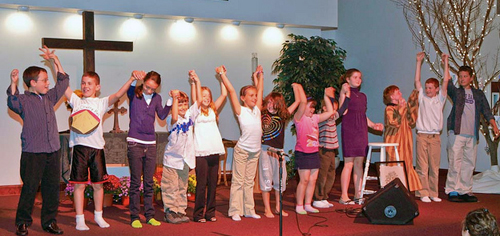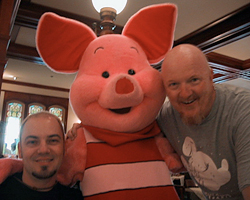AND so Perkasa has made the news again. And this time by its own doing, not because a media bent on sensationalism tried to cultivate the Malay nationalist group in order to increase readership.
In the latest of Perkasa moves, its Petaling chairperson, Zainal Abidin Ahmad, lodged a police report against a Protestant church in Shah Alam and its pastor for planning to stage a Christian play during Ramadan. “We want the church and pastor to be investigated for sedition and for insulting the Sultan,” Zainal Abidin told The Malaysian Insider on 17 Aug 2010. Zainal Abidin also accused the church of deliberately attempting to preach Christianity to Muslims in Muslim-majority Shah Alam.
We may be lulled into thinking that the issue at hand is limited to a Malay, and hence Muslim, rights group making wild and curious allegations against non-Muslim, non-Malay Malaysians. If only that were the case. Unfortunately, much more is involved. Indeed, what is really at stake is the control of public space and what it means for all of us.
My space, not anyone else’s
What Perkasa’s actions boil down to in Shah Alam is this. It’s saying that because it’s Ramadan and because Shah Alam is a Muslim-majority suburb, no other faith group is allowed to practise freedom of religion, expression or association. If they do, they can be cited for sedition, insulting the Malay ruler, and the crime of proselytising to Muslims.
I suspect that the citations of sedition etc are just a means of asserting control and power. By making out non-Malay non-Muslims to be criminals of the highest order, it becomes that much easier for lesser-thinking members of the public to believe that non-Muslims deserve to have their constitutional rights denied.
We may dismiss Zainal Abidin, and even Perkasa as a whole, as lunatic. That would be a mistake. Because Zainal Abidin and Perkasa are not the only ones who want complete control of public space, and who use a particular version of Islam to exert that control. Additionally, they are not the only players in town who do this at the expense of the rights and freedoms of other citizens.
Let us remember that before Perkasa started making the headlines, the national censors in 2005 banned the movie Babe because it starred a pig, considered haram in Islam, as the lead character. Following that, anecdotes from parents tell us that in some schools, non-Muslims children are told what they can and cannot pack in their lunch boxes in deference to Muslim sensitivities.
A Malaysian columnist once also told me that the word “pigmentation” was censored from a documentary he had watched presumably because the first syllable was “pig”. And in 2007, I discovered that Guardian pharmacy did not offer Piglet as part of its Winnie the Pooh gift redemption promotion.
Over in Section 6, Petaling Jaya, the local mosque has no qualms blaring the terawih prayers till late at night at decibels that are inconsiderate to the neighbourhood.
And let us also remember PAS’s own moves to define what can and cannot be done in the public domain. Everytime PAS Youth calls for a concert ban, what it’s effectively doing is telling all those — Muslims and non-Muslims — whose faith would not be threatened by attending a live concert, that they cannot because PAS says so. Similarly, when Selangor PAS tried to ban the sale of beer in Muslim-majority areas in the state, what the party is saying is that the lifestyle of all non-Muslims must be subservient to those of some Muslims.
And so the proscriptions on public spaces don’t just include what a Protestant church is allowed to do during Ramadan. It also affects the food our children are allowed to consume in schools, the drinks non-Muslims can buy in their neighbourhood, the movies and concerts and words we are allowed to watch and hear, the gifts we can redeem at a pharmacy, and the airwaves in our neighbourhood.
What do these events tell us? They tell us that there is a creeping, even if not concerted, effort by state and non-state players, to determine what is publicly kosher and what is not. It doesn’t matter if nothing in Islam actually prohibits non-Muslims from staging a Christian play during Ramadan, drinking alcohol, eating pork and watching a pig character in the movies.
The bottomline? Public space is no longer everyone’s space. It’s theirs — those Malay Muslims who believe that their imagined sensitivities alone give them the right to deny others access and use of public spaces.
The biggie
The biggie of all proscriptions in the current Malaysian context is of course, the Barisan Nasional (BN) government’s ban of the words “Allah”, “solat”, “Kaabah” and “Baitullah” among non-Muslims.
Even though Muslims don’t own copyright to these Arabic words, the BN government is asserting that these words belong to Muslims, and Muslims alone. Particularly Malaysian Muslims who apparently are prone to being confused should another faith community use the same words.

Can Malaysia ban non-Muslims from using the Arabic language?
The ban on “Allah” and the three other words is no different from what Perkasa is doing in Shah Alam. A publicly-used word, like publicly-shared spaces, only belongs to Muslims. It’s as if these Muslim state and non-state actors are declaring, “Our space, not anyone else’s. Our word, not anyone else’s.”
And because their demands have no historical, cultural or legal legitimacy, they resort to demonising non-Muslims, accusing them of crimes and ill-intentions. And they use the powers of the state to impose and enforce ownership over “our space” and “our word”.
And so the biggie isn’t that our political landscape is littered more and more with irrational demands and wild allegations from certain Malay Muslim quarters. The biggie is that increasingly, there are more and more concerted attempts by these forces, which include the Umno-led federal government, to take over shared public spaces.
What’s the limit?
After the story on Perkasa’s police report was published, someone on Twitter commented that we can next expect police reports to be lodged against non-Muslims for eating during Ramadan. Indeed, I believe that’s not too far-fetched a scenario if we continue to allow those who try to control the public domain for their own narrow vested and bigoted interests, to continue doing what they do.
Already, non-Muslims are constantly being told to defer to the sensitivities of some Muslims. At the rate Muslim “sensitivities” are paraded about, one would think Muslims lived their lives like exposed nipples, ever excitable. When the truth is, we know that Muslims are thinking, rational human beings who belonged to one of the most historically advanced civilisations.
To be certain, there is a need to be respectful of different customs and belief systems. But “Muslim sensitivities” cannot and must not be the measure by which a non-Muslim citizen is denied the right to eat pork, watch a movie or use “Allah”. If we allowed that to happen, we would be a nation where behaving like an exposed nipple trumps constitutional rights to freedom of religion, assembly association and expression.
Jacqueline Ann Surin is thankful her perception of Islam has been shaped by intelligent, rational, kind and fair-minded Muslims who have been rocks in her life. Courtesy of Nut Graph







No comments:
Post a Comment
Note: Only a member of this blog may post a comment.